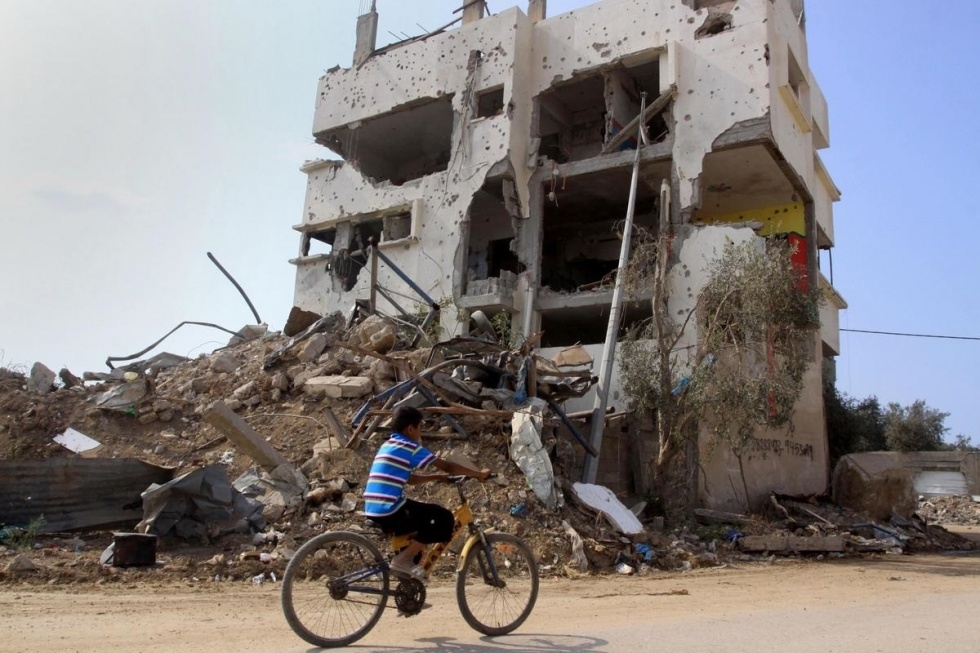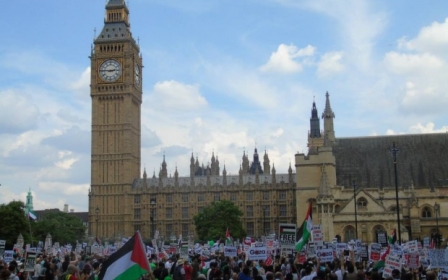Imperialist narratives and UN rhetoric on Protective Edge

As with other Israeli massacres, colonial tendencies have ensured that “Operation Protective Edge” is relegated to the periphery, with diplomacy taking precedence over the assertion of Palestinian history and memory. From the preliminary talks resulting in the forthcoming reluctant rebuilding of Gaza, to the speeches uttered at the United Nations General Assembly, political discourse remains centred upon adherence to the dominant narrative expressed by Israel and upheld by the compromised international community.
During and in the immediate aftermath of the relentless onslaught, Palestinian resistance asserted itself as a renewed force interrupting Israel’s certainties. A brief interlude during which Palestinian unity appeared to be based upon a common aim - the sentiment disintegrated rapidly to reveal a continued compromise based upon the two-state conspiracy as opposed to the original premise of armed resistance based upon the total liberation of historic Palestine.
As expected, the UN General Assembly provided the opportunity for imperialism to sustain its dominance through fragmentation and oblivion processes. Despite the magnitude of war crimes committed by Israel, rhetoric imparted the usual fabrication of Israel’s alleged right to defend itself while disregarding the plight of the colonised and dispossessed population.
While “Operation Protective Edge” constituted an additional step in colonial and imperialist expansion, through assertions of both territorial and ideological domination, conventional discourse sought to eliminate the historical implications related to the latest massacre, thus furthering the divide between the present deterioration and decades of colonial violence.
Insights into the speeches delivered by US President Barack Obama, Israeli Prime Minister Benjamin Netanyahu and PA President Mahmoud Abbas indicate a common goal - that of obliterating Palestine through an enforced dynamic that creates an illusion of equality between imperialist and subjugated nations. Hence Obama’s statement: “We will stand up for the principle that Israelis, Palestinians, the region and the world will be more just with two states living side by side, in peace and security.”
The premise for such a statement lies in the promulgated “right” of a colonial power to defend itself against a colonised population, despite the illogical sequence. However, eliminating the illusion of defence from the equation would be tantamount to a partial dissolution of imperialist domination and expansion in the Middle East. Hence the continuous reference to obligations, within the context of the UN and its designated charters, in order to consolidate the manipulation of Palestinian history through international law, which has been used relentlessly to invalidate Palestinian right to armed resistance and liberation from colonialism.
In concordance with Obama’s discourse, Netanyahu expounded upon a fabrication of defence, borders and territory that is expanded within the context of a single comment: “Israel’s fight against Hamas is not just our fight.” The allusion to internationalising alleged terrorism is a reflection of Israel’s expectations of the international community embracing colonial propaganda which, in return, would serve to provide an erroneous legitimacy for Israel’s colonial massacre in Gaza.
Evidence of war crimes committed by the settler-colonial state were discarded by Netanyahu and his allies in favour of “imagination” - a concept that transformed relentless bombardment and international support for murdering the indigenous population into a simplification of Hamas firing “thousands of rockets.”
If the concept of Israeli “imagination” is to be reversed, the preliminary conjecture of defence, borders and territory, which prevails as a recurring justification for each violation committed by the settler-colonial state, should be deconstructed within the Palestinian historical framework. Alienation from history - an integral component of imperialism - is applied to separate each instance of colonial violence as an errant occurrence.
Colonial ideology and application, therefore, are intentionally displaced to divert attention away from the initial Zionist settler-colonial project prior to the illegal establishment and recognition of Israel by the international community. Israel’s illegality renders Palestinian resistance legitimate, including the non-recognition of the settler-colonial state’s “borders” and the resistance’s right to utilise all territory, including that colonised by Israel, to secure liberation.
However, some Palestinian leaders have diverged from history in order to accommodate imperialist manipulation. The initial aims of liberation have long since been mellowed into compromise, in return for seeking a semblance of legitimacy from the imperialist-supported colonial oppressors. The destructive cycle is evident - as the Zionist colonial process progresses, resistance will also be reversed into a series of political negotiations mirroring the ultimate oppressive ambition of complete colonisation. From a historical perspective, Palestinian factions have largely abandoned the aims enshrined in their charters, which recognise the importance of fighting against colonial and imperialist violence.
Moreover, history is continuously manipulated to reflect little more than a detached evocation by Palestinian leaders – a point of reference would be Abbas’s speech at the UN General Assembly. Commencing with a reminder about the atrocities committed during Operation Pillar of Defence in 2012, Abbas stated, “I appealed to you: Prevent a new Nakba. Support the establishment of a free and independent Palestine.” The rhetoric also attempted to convey the importance of memory, with Abbas stating, “We will not forget and we will not forgive, and we will not allow war criminals to escape punishment.”
However, both statements lose their significance within the two-state solution framework. As the Nakba is divested of its tangible history and ramifications, Abbas’s use of terminology and language provides nothing substantial - just a mere embellishment of text. Prior to the ceasefire brokered upon further compromise to the detriment of Palestinians, Abbas’s tactic of vilifying Palestinian resistance complemented the ensuing immediate oblivion, namely the intent to resume negotiations with Israel based upon the two-state indignity. Herein lies an important factor contributing to the decline of Palestinian rights - resistance is relegated to outbursts of necessary defence as opposed to a constant necessity.
The detachment between resistance and Palestinian rights is exacerbated also within the context of the unity government - a political formation through which, despite discourse to the contrary, Hamas has continued to assert its deviation from total liberation of Palestine by acquiescing to imperialist demands of recognising Israel’s right to exist. While not a recent overture, albeit one that is routinely contradicted through conflicting statements, resistance within the current context following Israel’s latest colonial atrocities will remain tethered to a lack of declared strategy, a phase substituted by diplomatic engagement encouraging deviation from absolute liberation.
- Ramona Wadi is an independent researcher, freelance journalist, book reviewer and blogger specializing in the struggle for memory in Chile and Palestine.
The views expressed in this article belong to the author and do not necessarily reflect the editorial policy of Middle East Eye.
Photo credit: A boy on a bike in Gaza (AA)
New MEE newsletter: Jerusalem Dispatch
Sign up to get the latest insights and analysis on Israel-Palestine, alongside Turkey Unpacked and other MEE newsletters
Middle East Eye delivers independent and unrivalled coverage and analysis of the Middle East, North Africa and beyond. To learn more about republishing this content and the associated fees, please fill out this form. More about MEE can be found here.





